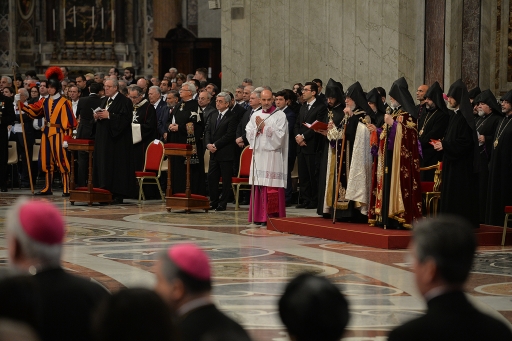Pope Francis has sparked a diplomatic row with Turkey by describing the mass killings of Armenians during the First World War as ‘genocide.’
His comments came during a Centenary service at St. Peter’s in Rome on April 12th 2015, attended by Armenian clergy and President Serzh Sargsyan.
Turkey, which strongly denies that genocide took place, has recalled its ambassador to the Vatican in protest. It says the Pope’s remarks “regarding the 1915 events contradict historical and legal facts.”
In his address, the Pope Francis said: “In the past century our human family has lived through three massive and unprecedented tragedies. The first, which is widely considered ‘the first genocide of the twentieth century’ struck your own Armenian people.
“We recall the centenary of that tragic event, that immense and senseless slaughter whose cruelty your forebears had to endure. It is necessary, and indeed a duty, to honour their memory, for whenever memory fades, it means that evil allows wounds to fester.
“Concealing or denying evil is like allowing a wound to keep bleeding without bandaging it.”
The other two unprecedented killings of the 20th century had been perpetrated by Nazism and Stalinism, Pope Francis argued.
Turkey swiftly issued a statement condemning his comments. It accused him of “falling under the influence of the Armenian narrative” and selectively ignoring “the tragedies that befell the Turkish and Muslim peoples who had lost their lives in World War I.”
A Foreign Ministry statement said Pope Francis had called “the events of 1915′ a ‘genocide’, despite the absence of any such competent court judgment.”
The Vatican Ambassador in Ankara was summoned to hear the government’s objections. Turkey has also recalled its envoy to the Holy See for consultations, in effect a diplomatic protest.
Bitter legacy
The mass killing of Armenians in the Ottoman Empire during the First World War remains one of the most bitter legacies of the conflict.
Armenia will commemorate the centenary of what it regards as the start of genocide on April 24th 2015.
On that day 100 years ago, the eve of the Allied landings at Gallipoli, the Ottoman government ordered the arrest and removal of Armenian intellectuals and community leaders in Constantinople (now Istanbul).
Estimates of the numbers of Armenians who were killed or died from starvation and disease during subsequent deportations from Turkey to the Syrian desert and elsewhere vary widely, from 500,000 to 1,500,000.
Armenia has issued a Pan-Armenian declaration for the Centenary, under the motto ‘I remember and demand,’ calling on the Republic of Turkey to “recognise and condemn the Armenian Genocide committed by the Ottoman Empire.”
But Turkey insists that “no authentic evidence exists” to support the claim of a premeditated Ottoman plan to kill off Armenians.
It says the aim was to move the Armenian population from the war zone and the advancing Russian army, to southern provinces of the empire.
Belgium, Canada, France, Italy, and Russia are among countries which have formally recognised the killings as genocide.
*The full text of Pope Francis’s address can be found on the Vatican Daily Bulletin.
*Ankara’s response is on the Turkish Ministry of Foreign Affairs website.
*The Pan-Armenian Declaration was issued on January 29th 2015.
*A statement of Turkey’s position can be found on the Foreign Ministry website.
Sources: Vatican City Daily Bulletin; Turkish Foreign Ministry
Images courtesy of the President of the Republic of Armenia’s Office
Posted by Peter Alhadeff, Centenary News
